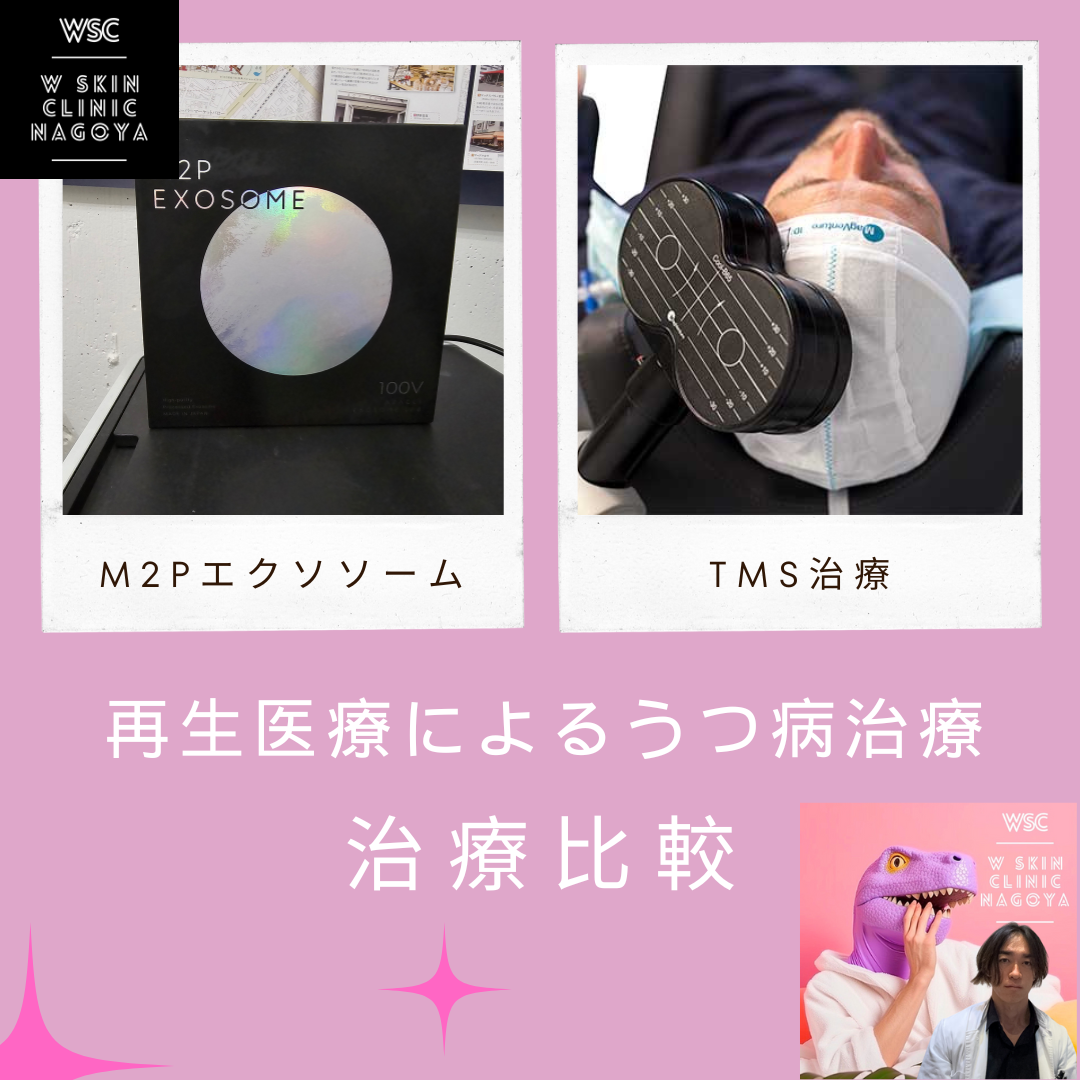NEWSお知らせ
2024.10.21|ブログ
うつ病の症状は体の症状も認めることがあるため、TMS治療での脳細胞の活性化と並行して、エクソソーム治療を行うことは理にかなっているか?名古屋の美容皮膚科医が解説

うつ病の症状は体の症状も認めることがあるため、TMS治療での脳細胞の活性化と並行して、エクソソーム治療を行うことは理にかなっているか?名古屋の美容皮膚科医が解説
こんにちは、Wスキンクリニック名古屋、院長の加藤晃司です。
今回は、うつ病の症状は体の症状も認めることがあるため、TMS治療での脳細胞の活性化と並行して、エクソソーム治療を行うことは理にかなっているか?について解説します。
うつ病は、主に精神的な症状(気分の落ち込み、意欲低下、集中力の低下など)が特徴ですが、体の症状(疲労感、睡眠障害、食欲の変化、頭痛、筋肉痛、胃腸の不調など)も伴うことが多いです。これらの体の症状は、うつ病に関連する神経系の変調やホルモンバランスの乱れなど、複雑な生理的メカニズムが関与しています。
TMS治療(経頭蓋磁気刺激治療)は、脳の特定領域、特に前頭前野をターゲットにして、脳細胞を活性化し、神経伝達物質のバランスを改善する治療法です。一方、エクソソーム治療は、細胞間で情報伝達を行うエクソソームを用いて、細胞再生や修復、免疫調節を促進する治療法であり、組織の修復や抗炎症効果が期待できます。
- TMS治療による脳の活性化と効果
TMS治療は、うつ病に対して効果が証明されている治療法であり、主に次のような作用が期待されます。
脳細胞の活性化: TMS治療は、脳内の特定領域に磁気パルスを当てることで、脳細胞の活動を促進し、神経伝達物質(セロトニン、ドーパミン、ノルアドレナリンなど)の分泌を増やします。これにより、気分の改善や意欲の回復が期待できます。
神経ネットワークの調整: うつ病は、脳内の神経ネットワークの機能不全が一因とされています。TMSは、神経回路を再調整し、バランスを回復することで、精神的な症状の改善を促します。
ただし、TMS治療は脳に焦点を当てた治療であり、うつ病に伴う体の症状(慢性的な疲労感、筋肉痛、頭痛など)の直接的な改善には、限界があることもあります。
- エクソソーム治療の作用と適応
エクソソームは、細胞が分泌する小さな小胞で、細胞間で情報を伝達する重要な役割を果たします。エクソソームは、幹細胞由来のものであることが多く、細胞の再生・修復、炎症の抑制、免疫調整などに関与します。
エクソソーム治療の主な効果
細胞再生と修復: エクソソームは、損傷した組織の再生や修復をサポートします。うつ病に伴う体の疲労感や痛みは、細胞レベルでの炎症やストレスによる影響が関与していることが多く、エクソソーム治療はこれらの細胞機能を改善する可能性があります。
抗炎症効果: エクソソームは、体内の炎症を抑える働きも持っているため、うつ病に関連する身体的な症状、特に慢性的な炎症が関与する疲労感や痛みの軽減が期待できます。
神経保護: エクソソームは、神経細胞の保護や修復にも寄与することが示されています。これにより、脳内での神経機能の維持・再生を助け、TMS治療と相互に作用する可能性があります。
- TMS治療とエクソソーム治療の併用が理にかなっている理由
相補的な作用メカニズム
TMS治療は、脳の神経回路に対して直接的に刺激を与え、神経伝達のバランスを整えることで精神的な症状を改善します。これにより、気分や集中力の向上が期待できますが、体の疲労感や痛みなどには直接的な効果が少ないことがあります。
一方、エクソソーム治療は、体全体の細胞再生や修復、免疫調整を行うため、うつ病に伴う体の症状、特に慢性的な疲労、筋肉や関節の痛み、免疫機能の低下などに対して効果が期待できます。
両者の治療は、脳と体の両方にアプローチすることで、うつ病に関連する精神的・身体的な症状の両方を総合的に改善できる可能性があります。
体と心の相互作用をサポート
うつ病は、心と体の相互作用が大きく、精神的な不調が体に症状を引き起こす一方で、体の不調がうつ病の症状を悪化させることがあります。TMS治療とエクソソーム治療を併用することで、脳と体の両方に働きかけ、心身の回復を促進することが理にかなっています。
TMS治療が脳の機能を改善し、神経系のバランスを整えることで、精神的な症状を軽減し、
エクソソーム治療が細胞レベルで体の機能を改善し、身体的な症状を軽減することで、全体的な健康状態が改善します。
慢性炎症やストレスに対する効果
うつ病に伴う体の症状には、慢性的な炎症やストレスによる影響が関与することがあります。TMS治療は、脳の機能改善に焦点を当てていますが、エクソソーム治療は炎症を抑える効果があるため、体全体のバランスを整えるのに役立つと考えられます。これにより、疲労感や痛みが軽減され、より総合的な治療が可能になります。
- TMSとエクソソーム治療の併用によるメリット
精神面と身体面の同時改善: 脳の活性化(TMS)と、身体の細胞再生や修復(エクソソーム治療)を同時に行うことで、うつ病の精神的・身体的な両面からのアプローチが可能になります。
治療効果の相乗効果: TMS治療による神経伝達の改善と、エクソソーム治療による細胞修復や炎症抑制が相互に作用することで、治療効果が相乗的に高まることが期待できます。
生活の質(QOL)の向上: 身体的な不調が改善されることで、日常生活の中での活動がしやすくなり、全体的な生活の質が向上する可能性があります。
まとめ
うつ病は、精神的な症状に加えて、体の症状も認められることが多いため、TMS治療での脳の活性化と並行して、エクソソーム治療を行うことは理にかなっています。TMS治療は脳の機能を改善し、精神的な症状にアプローチする一方で、エクソソーム治療は体全体の細胞再生、修復、免疫調整を促進し、身体的な症状を改善するため、両者を組み合わせることで、うつ病の総合的な治療効果が期待できます。
Wスキンクリニック名古屋でのエクソソーム治療はこちら
https://www.w-clinic-nagoya.com/acne/exosome
NMN点滴はこちら
https://www.w-clinic-nagoya.com/beauty-drip/nmn
高濃度ビタミンC点滴はこちら
https://www.w-clinic-nagoya.com/beauty-drip/vitamin-c
*当院では
NMNは一般社団法人NMN医療研究会、エクソソームはセルソース株式会社のM2P-エクソソームを使用しています。
TMS治療はこちら
https://www.w-clinic-nagoya.com/tms
当院では無料でスタッフカウンセリングを行なっております。
お気軽にご予約くださいませ
Wスキンクリニック名古屋 (美容皮膚科)
https://www.w-clinic-nagoya.com/
〒461-0005 愛知県名古屋市東区東桜 2-4-1 第3コジマビル6F
TEL 052-7377-7117(10:00~19:00)
LINE ID @w.nagoya
高岳駅より徒歩4分 / 新栄町駅より徒歩5分
お車でお越しの方
名鉄協商パーキングチケットをお渡しいたしますので、クリニック近くのパーキングをご利用ください。
ご予約、お問合せ、Wスキンクリニック名古屋公式LINEからも可能です。
LINE ID : @w.nagoya
友達追加は↓から
Wスキンクリニック名古屋公式インスタ↓
https://www.instagram.com/w.skinclinic.nagoya?igsh=NHhoODFnaXB2b2ll&utm_source=qr
Wスキンクリニック院長 加藤晃司インスタ↓
https://www.instagram.com/w.skin.nagoya.kojikato?igsh=aW9nbWZwNjNjZ3pz&utm_source=qr
Does It Make Sense to Combine Exosome Therapy with TMS Treatment for Depression, Considering That Depression Can Also Cause Physical Symptoms? A Nagoya Dermatologist Explains
Hello, this is Koji Kato, director of W Skin Clinic Nagoya.
Today, I will explain whether it makes sense to combine exosome therapy with TMS (Transcranial Magnetic Stimulation) treatment for depression, given that depression can manifest with physical symptoms as well.
Depression is typically characterized by mental symptoms such as low mood, lack of motivation, and difficulty concentrating. However, it often comes with physical symptoms, such as fatigue, sleep disturbances, changes in appetite, headaches, muscle pain, and digestive issues. These physical symptoms are often the result of neurological dysfunctions and hormonal imbalances associated with depression, making the condition more complex.
TMS treatment is a brain-targeting therapy, particularly aimed at activating brain cells in the prefrontal cortex, improving neurotransmitter balance to alleviate depressive symptoms. On the other hand, exosome therapy involves the use of exosomes, which are tiny vesicles responsible for intercellular communication. This therapy promotes cell regeneration, repair, and immune modulation, offering potential benefits such as tissue repair and anti-inflammatory effects.
- How TMS Treatment Activates the Brain and Its Effects
TMS treatment is a proven, effective therapy for depression, with the following key effects:
Brain cell activation: TMS applies magnetic pulses to specific brain regions, boosting brain cell activity and increasing the production of neurotransmitters such as serotonin, dopamine, and norepinephrine. This can help improve mood and restore motivation.
Neural network adjustment: Depression is often linked to dysfunctions in neural circuits. TMS helps recalibrate these circuits, restoring balance and improving mental health.
However, TMS is primarily focused on brain function, so it may not fully address the physical symptoms of depression, such as chronic fatigue, muscle pain, and headaches.
- Exosome Therapy's Mechanism and Indications
Exosomes are small vesicles secreted by cells that play a crucial role in intercellular communication. Often derived from stem cells, exosomes aid in cell regeneration, repair, inflammation suppression, and immune regulation.
Key effects of exosome therapy:
Cell regeneration and repair: Exosomes support the regeneration and repair of damaged tissues. Fatigue and pain associated with depression are often linked to cell-level inflammation or stress, and exosome therapy may help improve these cellular functions.
Anti-inflammatory effects: Exosomes also have anti-inflammatory properties, which could alleviate physical symptoms of depression, particularly those related to chronic inflammation such as fatigue and pain.
Neuroprotection: Exosomes contribute to protecting and repairing nerve cells, which may synergize with TMS treatment to improve brain function.
- Why Combining TMS Treatment and Exosome Therapy Makes Sense
Complementary mechanisms of action:
TMS treatment stimulates specific brain circuits and balances neurotransmitter activity, improving mental symptoms such as mood and concentration. However, its direct effect on physical symptoms like fatigue and pain may be limited.
In contrast, exosome therapy promotes body-wide cell regeneration, repair, and immune regulation, addressing the physical symptoms of depression, such as chronic fatigue, muscle pain, and immune dysfunction. Together, these treatments can tackle both the mental and physical aspects of depression more comprehensively.
Supporting the mind-body connection:
Depression involves a strong mind-body interaction, where mental distress can trigger physical symptoms, and physical discomfort can worsen depressive symptoms. By combining TMS and exosome therapy, both brain and body can be treated simultaneously, supporting recovery from both mental and physical aspects of depression.
TMS treatment improves brain function and balances the nervous system, relieving mental symptoms.
Exosome therapy enhances cellular function and reduces physical symptoms, such as fatigue and pain, leading to overall improvements in health.
Addressing chronic inflammation and stress:
Physical symptoms related to depression often involve chronic inflammation or stress. While TMS focuses on brain function, exosome therapy's anti-inflammatory effects can help restore balance throughout the body. This could lead to a reduction in fatigue and pain, making the treatment more comprehensive.
- The Benefits of Combining TMS and Exosome Therapy
Improvement in both mental and physical symptoms: By activating the brain (TMS) and enhancing cell regeneration and repair (exosome therapy), both the mental and physical aspects of depression can be addressed simultaneously.
Synergistic treatment effects: TMS improves neurotransmission, while exosome therapy supports cellular repair and reduces inflammation. These combined effects may enhance the overall treatment outcome.
Improved quality of life (QOL): As physical discomfort decreases, daily activities become easier, leading to an overall improvement in quality of life.
Conclusion
Since depression often manifests with both mental and physical symptoms, it makes sense to combine exosome therapy with TMS treatment. TMS focuses on improving brain function and mental symptoms, while exosome therapy promotes body-wide cell regeneration, repair, and immune modulation to address physical symptoms. Combining these treatments offers a comprehensive approach to managing both the mental and physical dimensions of depression.




